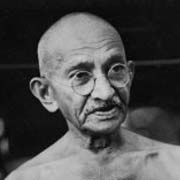

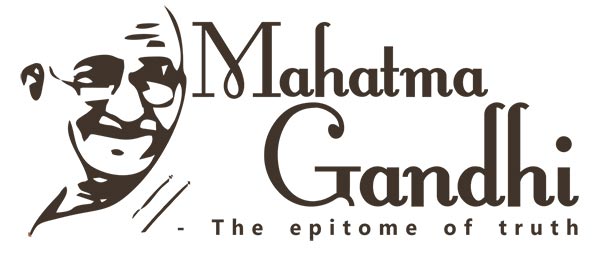
Tags : Leader, Father of the Nation, Indian Independence Movement, Ahimsa, Indian National Congress, Swaraj, Dandi Salt March
- Text Size +
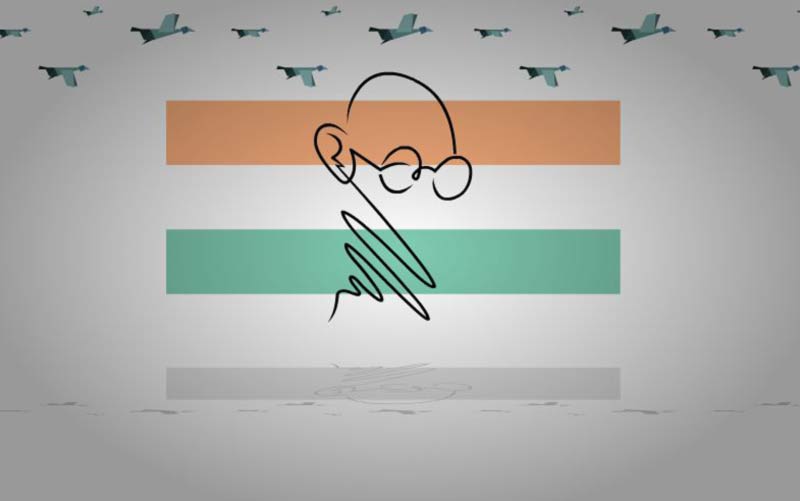
Introduction
In a world where the term ‘politician’ springs an image of cold, ruthless creature resplendent in their gowns of greed and avarice, there arose a man from a small town in Gujarat who went on to become one of the greatest emancipators that this world has ever witnessed – the Mahatma Gandhi. This Mahatma won the Indian hearts through his benevolent ways and great deeds. He once famously said, “Men say I am a saint losing myself in politics. The fact is I am a politician trying my hardest to be a saint.” His actions proved the truth of these words as he fought for Indian Independence in a way which remains unparalleled to this day. He was known as much for his minimalistic attire and gentle demeanour as for his revolutionary thoughts and actions. He had a singular belief that all human beings are ‘children of God’ and nobody is evil. He turned his enemies into friends by means of truth and non-violence and preached righteousness and truth as the only religion. He battled many fierce adversaries and triumphed over them; the weapons in his arsenal were simple yet immensely powerful–‘truth’ and ‘non-violence’.

The piteous ancestry
The Gandhi family dwelled in a small town ‘Porbandar’ in Gujarat which lies in western India. Gandhi synonyms with grocer, which had been their walk of life for generations. Uttamchand Gandhi, Gandhiji’s grandfather was the prime minister or the ‘Diwan’ of Porbandar. His son Karamchand Gandhi, Gandhiji’s father was also the Diwan of Porbandar for some time. Karamchand Gandhi, an honest, brave and courageous man, was compassionate towards the people of his state. His wife Putlibai, a selfless lady, had the proclivity of visiting temples everyday and observing strong vows and fasts. She was intensely devoted to the qualities of sacrifice and service. Karamchand Gandhi had five children; two daughters from his first wife who had died and one daughter and two sons from Putlibai. Finally, Putlibai gave birth to the sixth and the youngest bundle of joy, Mohandas Karamchand Gandhi on 2nd Oct, 1869, in ‘Kirti Mandir’ where they lived. Nobody had perceived that this little infant would carve himself into an immortal ‘Mahatma’ for the nation.
Gandhiji grew with his mother’s teachings and witnessing his father’s truth and love for his clan. At the age of six, Gandhiji started his schooling in Porbandar. Later, at the age of seven, Gandhiji’s father became the Diwan of Rajkot and the Gandhi family migrated from Porbandar to Rajkot where Gandhiji continued his education. He was extremely sheepish, timid and mediocre student, but was obedient and had a lot of respect for his elders.
Once a supervisor visited his school and dictated five words in the class, out of which the word ‘kettle’ was misspelled by Gandhiji. The teacher noticed him and inclined him through gestures to copy from the student sitting next to him. But Gandhiji, even after understanding the gestures, did not go against his principles. When all the students got all five correct and Gandhiji got only four, the teacher berated him for his actions. At that very young age Gandhiji apprehended the difference between ethical and unethical. The teacher who instilled those morals in him was only the one prompting him to go against them. But neither did Mahatma cheat nor did he lose respect for his teacher.
Gandhiji was fond of Shravana Pitribhakti Natak (a book of Shravana’s play about his devotion to his parents) and wanted to serve his parents like Shravana. He was also very fond of watching Harishchandra’s play and wanted to follow truth and honesty like him.

The Childish Husband
Gandhiji, at the age of 13, tied the knot with Kasturbai who was also the same age. Child marriages were then quite common in India. During those times, the Hindu weddings were huge, expensive and elegant affairs and due to this, the Gandhi family decided to marry Gandhiji, his elder brother and his cousin at the same time to save the expenditure and spare the costs of three separate celebrations.
The young couple was shy and would hesitate to talk to each other. But very soon, the shy introvert child Gandhiji, tried becoming bossy and jealous husband who would not let Kasturbai play with her friends and would restrict her from going anywhere without his permission. Many a times, rebellious Kasturbai would not pay heed to him, leading to furious arguments between them. The situation would worsen to the extent of not speaking to each other for days. The child groom who was trying to act like a husband was actually a kid at heart. Being frightened of darkness during the night, he would light a lamp when he slept due to his fear of ghosts, but would never disclose this to his wife.

A Slip-Up
At one end he was striving to be a husband, whereas on the other he was still in high school where his scholarship had sharpened leading towards achieving many small prizes. In high school Gandhiji always wished to emulate his friend Sheikh, not because Sheikh possessed some extra grey matter or wit but because he was tall and muscular. Sheikh once revealed that meat was the only reason behind his strength and told Gandhiji that strength and power were the attributes of only meat eaters. The students during those times in Gandhiji’s high school would recite a poem,
Behold the mighty Englishman,
He rules the Indian small,
Because being a meat-eater,
He is five cubits tall.
In those days, every Indian envisioned themselves to breathe an air of freedom. Gandhiji being a patriot, always wished to conquer the British and to make his dream of freedom come true he thought strength was extremely essential. An immature Gandhi triggered with the feeling of patriotism thought that consuming meat was the only way he could build his tower of strength. The little guileless adolescent consumed meat for the first time near a riverside with his friend Sheikh. The goat’s meat tasted to him like leather. He was also hit by a dreadful nightmare that night in which a goat was bleating in his stomach. Though petrified and disturbed with the nightmare, he still did not give up and continued eating meat longing to be powerful. Later on, he built a taste for the delicious meat curries that Sheikh would bring for him. Though he longed for freedom and
thought eating meat would win him one, he failed to realize the sin he was indulging in by hiding this truth from his mother. He also indulged in smoking in the company of Sheikh, his brother and a relative. One day, in order to pay a debt he stole a piece of gold from his brother’s jewellery and later when he realized his misstep, he confessed it on a piece of paper and handed it to his father. Karamchand, an aggressive man, would have been expected to blaze with anger at such a situation, but the unexpected occurred. The ailing father, on hearing of his son’s misdeed simply turned his back and wept copiously. Gandhiji was moved by this incident and decided of never lying to his parents again. This act of his father taught him non- violence which he then followed throughout his life. In the company of Sheikh, Gandhiji also visited a brothel once but when he sat on the bed next to the woman, his lips were sealed. He left that place in aversion and was abused by that female. He later felt glad that he was saved from committing the sin of being deceitful to his wife.
His father stayed ill after this and passed away when Gandhiji was only 16 years. After this he graduated from high school and enrolled in a small Indian college which he disliked and returned home in the middle of a term. A family friend then advised Gandhiji to equip himself for eventual succession of his father’s post as a prime minister of the state after earning a law degree from England. Though Gandhi was interested in studying medicine, the idea of going to England excited him. But in those days, going abroad was unacceptable in their community. Even Putlibai and Kasturbai were not very pleased with his decision as they feared he would take up to alcohol, meat and women like the English men. But Gandhiji had made up his mind to leave. The community heads considered him outcaste after this; for them he was a sinner. However, his mother blessed him with love and took a vow from him that he would not touch women, liquor and meat. Meanwhile, before he left, Gandhiji was blessed with his first son Harilal whom he had to leave in order to pursue his career at a young age of only nineteen years.
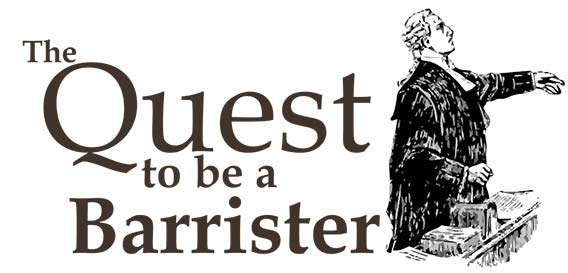
The Quest to be a Barrister
The moment Gandhiji stepped in England on October 28, 1888, all he could see was men with long black suits wearing hats around and he was the only one dressed in white. The shame of being the only one in white was already too much for him. He started feeling like an alien in the midst of Englishmen and tried learning the manners of life in London from some elders. He also faced difficulty in forming sentences and would feel shy of conversing with people. He became homesick and would dissolve in tears at night in the memory of his mother. He was also told by his friends that to survive in freezing England it was a compulsion to take up the habits of consuming meat and alcohol. But he did not want to break the vow he had given to his beloved mother before leaving. He preferred eating fruits and would refrain himself from touching meat. He found a vegetarian hotel later which was away from his residence but he never found any hardship in going there. Later, he started cooking at home for his own self.
He also tried to adopt the ways of the English men and took classes for dancing, speaking French and the art of talking to people. But very soon, he realized that trying to wear someone else’s skin will make him lose his own identity and become ludicrous. He also felt that he was wasting the hard earned money that his brother sent him. Soon, he took to a simple lifestyle wherein studying became his only aim in England.
Meanwhile, he became extremely friendly with an English family and gradually started getting involved with the two young daughters who belonged to it. He had hidden the truth of his marriage and his child from them. This was testing time for him and he remembered the promise he had made to his mother. He wrote a letter of apology to them revealing the truth about his marriage and him being a father.
During his stay in England he also got acquainted with some great men like Dadabhai Naroji, a man who laid the foundation of India’s freedom struggle and Dr. Besant, a freedom fighter. He would have never imagined that someday he too would be a great man like them. Gandhi read Bhagavad Gita ( the famous Hindu holy book) for the first time in England after which he started gaining interest in Hinduism and later Gita became his inspiration throughout his life.
Finally, he passed his examinations, was called to the bar on the 10th of June 1891, and enrolled in the High Court on the 11th. On the 12th, he sailed for home.
The Unsuccessful Barrister
When he returned back home in Rajkot, his brother welcomed him with a small procession and revealed the truth of his saint like mother not being alive anymore. Already facing the breakdown of his mother’s death, there was another anxiety which started building within him. He had learnt the laws but that of England. He knew nothing about the laws of his own country-India. The frustration within him kept rising even more when he realized he could not earn for his family in spite of being a barrister. Some of his friends advised him to go to Bombay and learn Indian law, which he did, but when he got his first case in Bombay he was too hesitant to cross-examine the witness and returned the fee for the case. Desperate, he tried to become an English teacher in school but was disqualified and rejected. Defeated, he left Bombay and went back to Rajkot. He was disgusted with his life in India and wanted to escape. Finally, destiny knocked his door and he got an opportunity by a large Indian firm in Porbandar to go to South Africa where he was supposed to assist in a long and complex case in the legal courts. They also promised him a good amount of salary and told him that it would take a year for him to complete the task. He accepted this proposal with delight. A second son named Manilal was born to Kasturbai after his return from England in 1892. He bid his family farewell in April 1893, not even twenty-four years now; he set his sail to South Africa to try his luck. He not only found luck, but found his life, his philosophy, himself.

Mohandas turns into ‘Mahatma’
During those times, South Africa was divided into four areas: Natal and Cape Colony were British possessions; The Orange Free State and the Transvaal were held by the Dutch, who were known as Boers, the Dutch word for farmer. The majority in South Africa were blacks and minority were whites but in spite of this, the minority ruled the majority by means of abuse and torture.
The condition of Indians in South Africa was piteous and they were considered as low class; referred to as ‘coolies’. The Indians could not own a land, were not allowed to do trade, were supposed to live in dirty areas, were not permitted to be on streets after nine in the night and a lot more nuisance. In short, an Indian was not a human being for the Europeans. Gandhiji sensed this in the atmosphere and very soon experienced it first hand while he was travelling to Pretoria.
In the middle of his journey to Pretoria, when the train reached Pietermaritzburg, the capital of Natal, at about 9 p.m, a white passenger who boarded the train objected to the presence of a ‘coloured’ man in the compartment. Gandhiji was ordered by a railway official to shift to a third class but he refused to do so, pointing towards his ticket which was first class. The constable threw Gandhiji and his luggage off the train, which continued its journey without him. He spent the night in the station’s unlit, unheated waiting room. It was bitterly cold, but Gandhiji’s overcoat was in his luggage and his luggage was in the hands of the railroad authorities. Gandhiji did not dare to ask them for the luggage for the fear of being insulted again. He kept shivering throughout that endless night and thought to himself whether he should fight for his rights or just go back home. By the end of the night, he made up his mind to fight not only for his own rights, but also for the rights of his people. The ordinary Mohandas set in motion towards becoming a ‘Mahatma’ which turned his life altogether.
He sent telegrams of protest to railroad officials and his employer Abdullah Seth. His employer sent a few merchants to his demise to make sure he was fine. The merchants narrated their stories to him and told him that the incident which occurred with him was not a matter of surprise and he should be prepared for such incidents as a part of his daily life in South Africa. The following evening, he was permitted to take the train to the end of the line. Next part of the journey to Johannesburg was by stagecoach, and the man refused to permit Gandhiji to sit with the white passengers. He sat beside the driver but wrote to his employer, strongly appealing to be seated inside the coach. His appeal was heard and he was seated inside from the next day. There’s a famous saying, “It doesn’t rain, it pours”, and the same thing happened with Gandhiji. When he reached Johannesburg, he was refused a hotel room. He spent the night with Indians who warned him that he won’t be issued a first class ticket as his skin is coloured. But a hard-nosed Gandhiji wrote to the station master requesting a first class ticket and he received it only because he was a Dutchman from Holland and not a local Boer. When a guard found Gandhiji in the first class he ordered him out, but another Englishman told him to leave Gandhiji alone. The astonished guard muttered, “If you want to travel with a coolie, what do I care.” Reaching Pretoria that evening neither did he get a hotel room nor did he meet someone. Fortunately, an American Negro came to his aid and helped him with a room in a small hotel run by an American.
Gandhiji never forgot the disgrace and humiliation he had to bear during his journey. In a week’s time he called a meeting of the local Indians to discuss their dreadful condition. In the discussion, the Indians made him aware of the grievous situation and told him how they were mistreated. Every Indian was addressed as a ‘coolie’; a Boer was a coolie Boer, a merchant was a coolie merchant, a barrister was a coolie barrister. Listening to their plight, Gandhiji’s tongue that always hesitated to speak had reformed altogether and he made his first public speech in that meeting. He explained them that a reform was only possible if Indians reformed themselves in the first place. He once said, “You should be the change you want to see in the world.” Gandhiji told them to change in the first place and be tolerant of their religious practices, be sanitary of their personal habits and be honest in their work; he promised to help them in the best way possible.
Later, Gandhiji sorted the case that he had come for and united both the parties outside the court by mutual settlement. He resolved a few more cases in the similar manner and finally headed to Durban for his return. In his honour, a party was organized in which few people threw a light on a bill in a newspaper. This bill, if passed, would deprive the Natal Indians to vote for the members of the legislative assembly. All present in the party requested Gandhiji to wait for a month and help them fight against this bill. The party was turned into a crusade for the civil rights of Indians, and Gandhiji decided to stay.

The Word of Every Mouth
Gandhiji drove a campaign to work against the bill immediately but in spite of opposition, the bill was passed. He knew this was only the beginning and he had a long way ahead to reach his goal. A monster petition was drawn, ten thousand signatures were obtained to support it and it was sent to the British secretary of state for the colonies. Thousands of copies were circulated in South Africa, England and India. Gandhiji knew publicity would work wonders and soon the British and Indian newspapers started spreading his word.
By now, Gandhiji’s one month was over but he could not leave Natal in the middle of the on-going distress. He decided to stay and fight until his motive was accomplished. He formed an organization called Natal Indian Congress to give a direction to achieve the desired Indian rights. All members paid the respective fees and some wealthier ones also made huge contributions.
Only one class-The Serfs were not a part of this organization as they could not afford the fees. One day, a serf arrived sobbing at Gandhiji’s place; he was brutally beaten up by his employer. All that Gandhiji could do for him was to transfer him to a new employer. But this small achievement made Gandhiji great in the lives of the serfs and exclaimed him as the only person who could help. The serfs were in severe need of help as the Natal government in 1894 had decided to rule them by putting an exorbitant annual tax on any serf who did not return to India or renew his indenture at the end of the bondage. Gandhi soon started a full-fledged campaign to eradicate this tax and soon his language was spoken not only in Natal, but also all across India.
After loads of attempts and failures, in 1896, Gandhiji returned back to Rajkot to bring his wife and children for staying along with him in Natal. Meanwhile, he gave lots of interviews, travelled extensively spreading his word, appealing sympathy for the South African Indians. The shy mediocre Gandhiji who hesitated to converse once was now the speaker of thousands of mouths of suffering Indians in South Africa. During this period, he wrote a pamphlet which was widely distributed amongst the Indian masses and a copy of the same was sent to England and also Natal. The pamphlet outraged the Europeans in Natal as Gandhiji had attacked them outside the country.
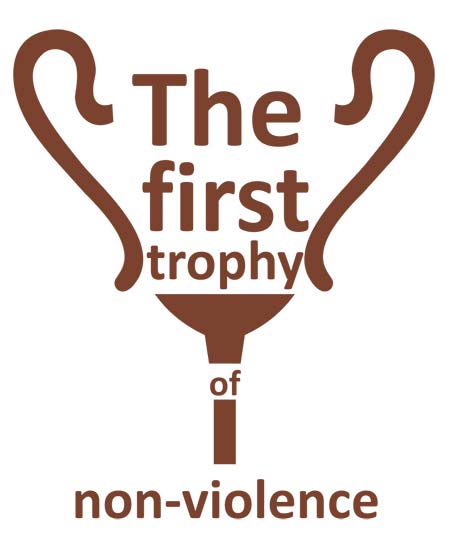
The First Trophy of Non-Violence
In December, Gandhiji sailed back to South Africa with his wife, two sons and an orphaned nephew. Another ship had left for South Africa at the same time which along with Gandhiji’s ship comprised of eight hundred passengers. The ships reached Durban on Dec 18 but they were not permitted ashore and were put on quarantine for the fear of Gandhiji; the Europeans thought he had bought eight hundred free men from India to fight them.
The exasperated and furious whites in Durban were waiting for Gandhiji to arrive and attack him. Finally, after twenty-three days, the ships were permitted ashore. Gandhiji’s pregnant wife and the three kids were driven in a carriage to an Indian’s house, while Gandhiji and an English attorney were to follow on foot. As soon as Gandhiji stepped ashore there was a huge outburst of rotten eggs, stones and bricks on him and the mob started screaming ‘Hang Old Gandhi’. They tore off his turban and clothes and he was beaten up brutally. A police superintendent’s wife came to his rescue and saved him from the ruthless mob. Such merciless protests against him continued outside his house several times following this incident. After these protests came to a rest, Gandhiji was asked to identify the people by whom he was assaulted. But the non-violent Mahatma refused completely saying, “I am sure that when the truth becomes known they will be sorry for their conduct.” His refusal to prosecute the victims dropped the heads of the whites in shame and many of them turned to be his patrons. It was the first victory of non-violence-which he had learnt from his father when he was young.

A Man of Truth
A man of truth, a man of non-violence, a man of service was a man-Gandhiji. He believed,that the only life worth living is the one where a person works with his own hands. He kept experimenting with his diet and started eating food without any condiments, without any taste. He believed that the taste of the tongue is a mere thought of the mind and a human body should not be restricted on to it. “To serve is my religion” he once said, and he kept following his religion until his last breath. In 1901, Gandhiji decided that it was time to go back to India to serve his own country. He left Natal promising that he would come back if they needed him. Back in India, he travelled places and attended the annual meeting of the Indian National Congress-the only political party existing in India at that time. He found the delegates weak and the party lacking a vision. He thought at that very moment that he would practice law and be a part of Indian Politics. But life demanded something else out of him, he received a cablegram from South Africa stating that Joseph Chamberlain-the British Colonial Secretary was expected in South Africa and he had to return immediately. Leaving his wife and children, he headed to South Africa to resume his mission.
Gandhiji’s mission was to persuade Chamberlain on behalf of the Natal Indians but he failed in doing so. Chamberlain said,“Your grievances seem to be genuine, but you must try to placate the Europeans if you wish to live in their midst.” Though Gandhiji failed to move Chamberlain in Natal, he did not lose hope and followed him in Transvaal. But the rigid authorities strongly restricted him,not only from meeting him but also from entering the premises. Soon he learnt about the Indians living in Transvaal and their painful conditions and decided to stay there and set up a law office in Johannesburg.
During this time in 1904,he found a weekly newspaper called ‘Indian Opinion’ which was comprised of his views and ideas and was published in Durban and Natal. It also contained various letters to the editor which had the views of the readers.
During one of his train journey he read a book ‘Unto This Last’ by John Ruskin. ‘The good of the individual lies in the good of the group’ was the idea that John Ruskin had stated in his book. Gandhi was highly inspired by this belief which transformed his life altogether. Immediately, he moved Indian Opinion and its staff to a farm at Phoenix, near Durban. There, his family accompanied him and they lived on the ideals of John Ruskin and worked with their own hands. When not working for the newspaper, they would engage in other activities of ploughing soil, grinding their meals and baking breads with their hands.
He also nursed the wounded Zulus in 1906 who rebelled in Natal and stood with the British Empire. Not quite 37 years old, Gandhiji took a vow of ‘Brahmacharya’ (celibacy) and did not break it throughout his life.He started teaching Kasturbai about the ideas he believed in and she also began following the ‘Mahatma’.
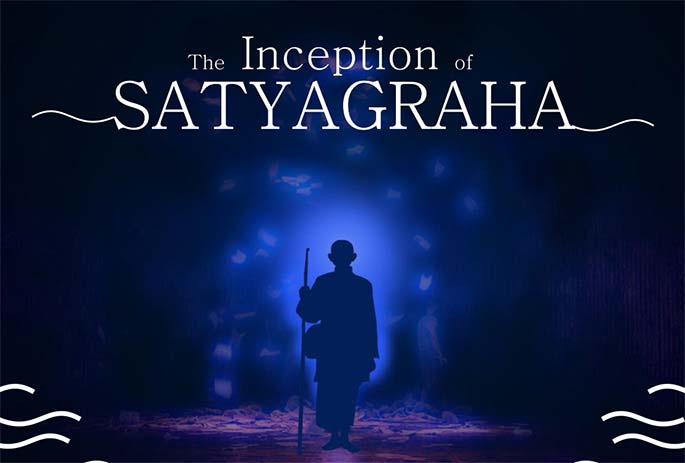
The Inception of Satyagraha
According to the ‘Asian Population Registration Act’, the Asians including Indians, had to register their name, age, address, job and other personal information and carry an identity card with their fingerprints at all times’. If they failed to do so, they were punishable and would be put in prison and charged heavy fines or deportation. The main agenda was to restrict more Indians from entering South Africa.
The act was passed in July 1907 and was called the Black Act by Indians. Gandhiji along with his followers, decided that they would die but not submit. And indeed they did not, except for five hundred people out of the thirteen thousand Indians in Transvaal. Gandhiji was imprisoned along with many of his followers. This movement against the Black Act was given the name of Satyagraha (truth-force) by him. The imprisonment was a brief one which lasted only for two months. When he was released, General Jan Christian Smuts, a Boer leader offered Gandhiji a settlement, stating that if the Indians stop‘flooding’ South Africa they would repeal the offensive Black Act. Trusting his words, Gandhiji became the first one to register;unfortunately Smuts went back on his words. The Indians felt betrayed by Gandhi and he was beaten up by them for his actions.
Later,in return to Smut’s treachery, the Indians led by Gandhiji met in the Hamida Mosque in Johannesburg on August 16, 1908, and burned two thousand registration certificates. Nearly thirty-thousand Indians were fearlessly defying the government of Transvaal. Gandhiji was jailed for the second time. He spent most of his time in jail reading books. The jails were flooded with satyagrahis and finally Gandhiji was freed. During the next six years,Gandhiji and his followers were arrested ample of times due to their non-violent rallies. To support his cause he often used ‘Indian Opinion’ which became one of his major means of communication.
When he came to know about the fusion of the four colonies into the Union of South Africa, Gandhiji headed off to London to fight for Indian rights. He found out that to maintain a racial bar is a matter of principle for the whites. He explored the relationship of the British with other countries. During his long voyage to South Africa, he wrote ‘Hind Swaraj’ or Indian Home Rule-a booklet which would make his campaign a never ending one.
As victory was nowhere in the picture so soon, he searched a home for his disciples called the Tolstoy Farm in Johannesburg which was given to him by one of his followers Herman Kallenbach. Hindus, Muslims, Jews, Christians, everyone lived in the farm together with equality. They would not use transport and along with this,eating non-vegetarian food, smoking and liquor were also banned. Gandhiji believed in plenty of exercise and a healthy lifestyle which was a norm followed in the farm.
In 1912,Gopal Krishna Gokhale visited Gandhiji and told him that Smuts had promised to repeal the Black Act. But Gandhiji was in doubt as he had already faced a betrayal from Smuts in the past. This time, he was right. The Boers once again went back on their words and oppression was piled on when a judge ruled that only Christian weddings will be validated and Hindu and Muslim weddings will not be registered.
The Satyagraha campaign revived again, this time like never before. Women participated for the first time including his wife Kasturbai. Many women were imprisoned and Indian men were fumed at the sight of women being tossed into jails.

Triumph in South Africa
Gandhiji incited the Indian miners to strike against the annual tax on free labourers. He hurried to Newcastle to organize the strike and suggested the men to abandon the mines and return with him to Transvaal in prison. In a single day, Gandhiji marched to Charlestown with about five thousand men. They camped for several days with the help of the local Indians who sheltered and fed them. It was time to call Smuts and make settlements. He did so, but Smuts was stiff and said,“I have nothing to do with you; you may do as you please.”
On 6th November, 1913, Gandhiji again set out with 2,037 men,127 women and 57 children and crossed the border of Transvaal continuing his protest. He was arrested the same night, but asked the miners to continue their protest unless he returned, and they did so. He was bailed out, but on 8th November, he was arrested once more while he was distributing bread to the marchers. He was again bailed and started marching, when on 9th November he was arrested for the third time in four days. Gandhiji was sentenced to twelve months of hard labour with his chief aides imprisoned with him.
Though Gandhiji was in jail, the miners wouldn’t move as they had decided they would not listen to any orders or threats, however worse it got. The government of Transvaal desperately wanted the miners and Gandhiji to get violent so that they too could get violent with them in return. But the non-violent Gandhi had left them paralyzed.
After trying every possible weapon, the government of Transvaal was in vain. They sent soldiers to force the miners to get back to work which killed and injured a vast number of them. The painful story of the miners was no more a hidden truth. The whole world was watching the injustice taking place with Gandhiji and his followers. The British Viceroy from India attacked the South African government and demanded an enquiry.
Smuts, disgusted with the situation called for an enquiry. The Indians demanded the satyagrahi prisoners be released, after which Gandhiji and some others were freed. But Smuts refused to include Indians in the commission. As a reply,Gandhiji announced a massive protest on 1st January, 1914, but due to a major railroad strike which paralyzed the nation on the same day, he decided to do it later. Gandhiji knew the strike would have turned the cards for him as the number of people in the protest would increase immensely due to strike, but he did not want to use his enemy’s weakness to his advantage. Gandhiji always wanted to win his enemies with love and he did so by postponing the protest.Smuts finally decided to meet Gandhiji. Several meetings were exchanged and finally ‘satyagraha’ led him towards his first victory. The tax was abolished and non-Christian marriages were recognized.
After twenty years of prolonged struggle in South Africa, Gandhiji had finished his fight. He not only gained freedom but he also learnt the power of truth and non-violence. The ‘Mahatma’ started off with his journey to India where he had a lot more to do for his people.He made up his mind to break the British rule and start the Independence Movement once again with the most powerful, priceless and matchless weapon ‘Satyagraha’.
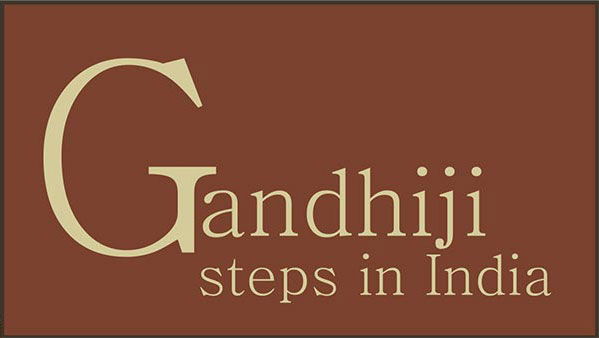
Gandhiji Steps In India
India, the sparrow of gold was ruled by many oppressors in the past, British being the last ones. The tiny Britain ruled a vast country and oppressed them with inequality and injustice. The greed for freedom lied in the heart of every Indian. Few Indian rulers of certain provinces would also wag their tails in front of the British. The nation was in distress and had the one and only political party-Indian National Congress. They demanded self-government in 1906 but their voice never reached Britain. An Indian assassinated a British Viceroy in 1912, but Nehru opposed terrorism and instructed the Indians to remain peaceful. The Indians were aware of their destination but unaware of the path to reach there; then stepped Gandhiji, on 5th January, 1915, in Bombay.
He was already well known in the country as ‘Mahatma’ as his crusade of South Africa was not hidden from anybody, but he disliked it as he considered himself a very ordinary man and felt that‘Mahatma’was too extravagant for him. He began staying with his followers in ‘Sabarmati Ashram’ also called ‘Satyagraha Ashram’ in Ahmedabad which he himself had found. He taught his followers the meaning and power of Satyagraha. Religious and political teachings would go hand in hand in the ashram.
Around eighty per cent population of India were peasants and without their support the dream of independence could never become a reality. To win their support, Gandhiji started wearing simple ‘loincloth’ like them. For him, freedom did not just mean freedom from the British but also freedom from poverty and inequality. He wanted to transform his motherland into a land of his dreams which was free of all strains.
He admitted a family of untouchables in his ashram to save them from the upper caste. He started working for the upliftment of various peasants in Champaran, Kheda and Ahmedabad for their respective rights.He began to use fasting as his weapon at various times to eradicate the injustice with peasants. Their plea would be heard and agreed only because the ‘Mahatma’ was fasting; nobody wanted him to die as he had become the most important person for the Indians. Thus, Gandhi had found another powerful non-violent weapon.
Gandhiji never took advantage of his enemy’s weakness; he proved it in South Africa itself and proved it again by helping the British with Indian soldiers during World War I. During the war, freedom of speech and civil rights of Indians were suppressed and the Indians expected them to be the same again after the war ended. But the story was the same even after the end of war. A British Commission headed by Sir Rowlett was sent to India for an enquiry and the Rowlett Act was passed on 18th March,1919,according to which the government could arrest and imprison people without any trial in a court of law and could impose restriction on civil rights of any person at any place who was suspected of terrorism.
Gandhiji announced a ‘hartal’(strike) in protest to the Rowlett Act on April 6th, 1919.The whole nation was at a standstill and later Gandhiji was arrested for his actions.Not everyone was a ‘Mahatma’ like Gandhi which was soon proved as people started looting, killing and rioting during the protest in Punjab. Gandhiji headed to Punjab to stop the nuisance but was arrested midway and sent back to Bombay. Upset,he called off the campaign and thought that his people still needed to understand the meaning of non-violence and the values of a satyagrahi. He appointed a few people under him to train others but all drifted away in a few days. He also began working on his newspapers ‘Young India’ in English and ‘Navjivan’ in Gujarati to educate people the ideals of Satyagraha.
The agitation continued in Punjab and martial law was proclaimed. Inspite of this, on 13th April ,in Jallianwala Baug, Amritsar,a meeting was held consisting of fifteen to twenty thousand people entirely enclosed by square buildings. While the meeting was going on, a British officer, Brigadier General Reginald Dyer entered with fifty armed soldiers and stationed them on either side of the main entrance; without warning,he ordered them to open fire on the mob. Almost four hundred people died on the spot and 1000 were severely injured during the incident. This event was called ‘Amritsar massacre’ or ‘Jallianwala Baug massacre’.
Gandhiji was shocked when he became aware of the massacre; he visited Punjab and conducted an enquiry for it. The people had now started to worship him and gave him another name ‘Bapu’ which meant father.
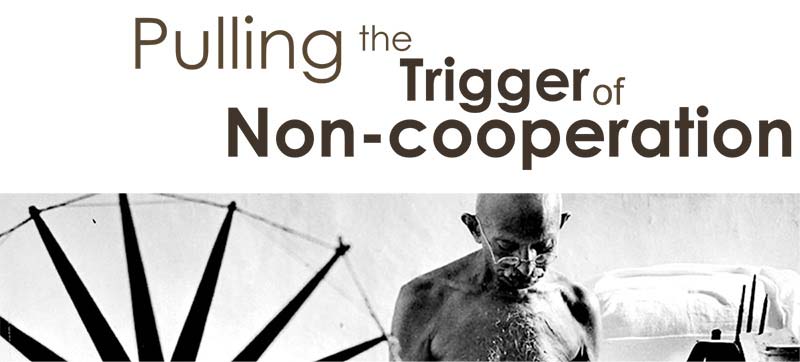
Pulling The Trigger of Non-Cooperation
Gandhiji’s next plan was the non-cooperation movement. The movement was held for a while due to British reforms offered but was later approved at the annual Congress convention. Gandhiji framed the new constitution and proclaimed the rule for the party which was to achieve home rule through the path of non-cooperation. He condemned the laws of untouchability and supported the use of ‘khadi’, while he boycotted foreign clothes.
At Sabarmati,along with his disciples,Gandhiji set up in motion with non-co-operation. As a part of the movement, he started spinning the wheel to make their own clothes out of ‘khadi’.He believed, it would help India eradicate poverty and Indians would no longer be dependent on British clothing.He preached the Indians to boycott British services and products and thought it was the best way to bring down the government.
Meanwhile, the Khilafat movement started in 1919; an attempt by the Indian Muslim community to support the ‘Khalifa’ of Turkey who was of great religious importance to them. The aim of the movement was to protest against England as they had attacked the Khalifa. Gandhiji related this movement with non-cooperation with the objective of gaining support of Muslims in ‘Swaraj’ (independence). Fortunately, he succeeded and it led to an entire non-violent unarmed army of Hindus and Muslims against the British.
Gandhiji was rebellious but in a peaceful manner. He had declared a war against the British, but a non-violent unarmed war. Suddenly, the demoralized Indians were charged up and ready to follow the ‘Mahatma’ blindly. For them, his words were precious and nothing could stop them from obeying him. All his followers, travelled across the states to preach non-co-operation. By September 1921,he adopted his permanent costume- the simple loincloth worn by most of the Indian peasants. The non-cooperation movement shocked the British authorities. On 4th, February 1922, in Chauri Chaura, a violent clash broke up between local police and protestors. Gandhiji went on a three days fast to appeal to the Indians to stop all resistance. The outraged British started bulking the jails with Indians and by December, twenty thousand Indians were jailed and the following month another ten thousand were in prison. Meanwhile, the Congress held its annual meeting in which Gandhiji was elected as the ‘sole executive authority’.
People lost their patience and were disappointed with the outcome. They expected home rule which was nowhere in the picture and instead there were riots and people getting arrested in bulks. Since Gandhiji never believed in violence, he feared to apply civil disobedience, but later he felt it was the only option left and decided to set off with it in a small area Bardoli, near Bombay where he could control it. However, before he could start up with his campaign, an Indian mob attacked a group of British policemen. Gandhiji realized that his men still did not know the meaning of Satyagraha and he called off all the campaigns of civil disobedience. He wished for a free India, but not on the cost of men put to death.
The British concluded this as his end and at 53 years of age, he was imprisoned for the next six years leaving the whole nation weeping and crying for him.
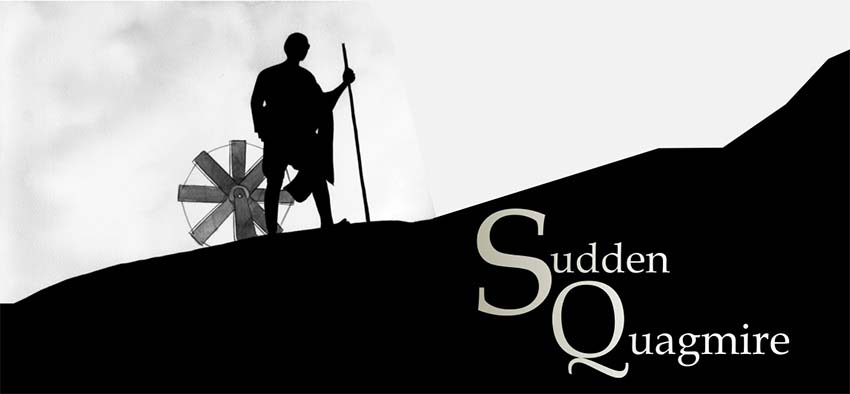
Sudden Quagmire
Gandhiji carried his wheel along with him in the jail and would spin clothes and read books. He also wrote his autobiography during those times. Unfortunately,he was attacked by appendicitis and fell sick in the jail. The British did not want him to die in their hands as they knew the consequences they would face after his death and so they called the Indian doctors.But Gandhiji was too sick to wait and after signing an agreement stating his will for the same, he was operated successfully by a British doctor.
Gandhiji took time to recover and was released from jail after two years of imprisonment. But when he returned, he found the feeling of Satyagraha, the struggle for freedom and all that he had envisioned, lost somewhere leading into a new horrific scenario of India. To his surprise, there were riots between the Hindus and the Muslims and they were no longer working together. In vain, he decided to purify India.
For him freedom could only be achieved if India was pure and never before that. He announced that he would fast for twenty-one days if the Hindus and the Muslims in the name of caste would not stop fighting. To dramatize the situation even more, he fasted in a Muslim’s house. While the fast lasted, millions of Hindus and Muslims took an oath to unite but soon Gandhiji’s sufferings were to prove futile as the bloodshed was yet to come.
In the coming years, though Gandhi remained in the Congress party yet he focussed only on working for the upliftment of the country. He was elected as the President of India in 1925. Later, he travelled throughout the country to collect funds for the movement; people would not only give him funds but also take his blessings. There were people who believed he was God and actually worshipped his photograph. But he never appreciated it as he considered himself an ordinary man.
Tired of all the travelling and speeches, Gandhiji spent a year in isolation in his ashram in the year 1926. This was called the ‘Silent Year’ which had fifty-two silent Mondays when he did not speak at all. In 1927, he again started with his tour to India and now also worked for the advancement and equality of women and abstinence from drugs and alcohol. In November, he was summoned by the Viceroy and informed about the British Commission that was coming to India. The agenda was to investigate and reform the conditions of the country.
‘A commission to reform India without a single Indian’ was not digestible for the people of the country. They revolted strongly against it by hanging flags and screaming “Go Back.” They could not afford their fate to be written once again by the British. Gandhiji realized that this was the right time to resume Satyagraha and it started from the place where it had ended-Bardoli. The taxes were increased by twenty-two percent for the peasants of Bardoli and Gandhiji told them not to pay the taxes. All the things which were bread and butter for them, their farms, animals and equipments were confiscated, but they remained strong and adamant.In protest, they observed a strike on June 12 throughout India.After a lot of struggle, in August, the tax increase was cancelled and Satyagraha led to feat once again.
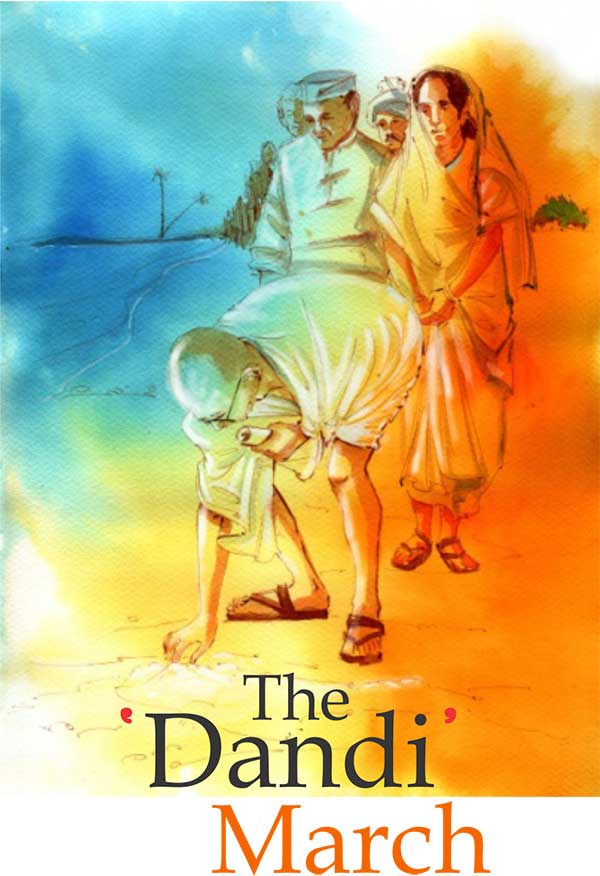
The ‘Dandi’ March
Everybody was awaiting Gandhiji’s next move. He had announced in the annual Congress meeting that henceforth, the fight would be for complete independence.Everyone thought Gandhi would declare a war now, but the great Mahatma maintained non-violence; for him, it was better to be ruled by the British than to attain freedom by means of violence. He was sure he wanted complete independence but was unsure of the first step. Soon,he got his first cause.
The British had monopoly on salt; no one could make, sell or purchase it from any other source except them. In February 1930, Gandhiji attacked the salt law which was supported by every individual in the country. The British salt was expensive for the peasant and the principle disgusting for the intellectuals.
To replace a few unjust laws, Gandhiji wrote a letter to the Viceroy but he was left unheard;disgusted,he decided to start with the ‘Dandi March’. On March 12,Gandhiji and 78 disciples headed towards south on foot. Each day more volunteers joined them and they reached seashore Dandi on 5th April, trekking two hundred miles in just twenty-four hours. Thousands of people had accompanied Gandhiji on the way and his presence made people feel blessed. They kissed his footprints as he walked. Everyone was curious of what Gandhiji was up to; next day at dawn,he went to the seashore and picked up a pinch of salt and defied the salt laws. This was a sign for the Indians that they should choose civil disobedience along with him and break the monopoly of British on salt.
All over India, there was an outbreak of a new revolution. People sold salt illegally and the British filled the jails with Indians. But the Indians became iron-jawed, they decided not to stop unless they had fulfilled their mission. Once again non-coperation had revived, people boycotted British goods and refused to pay taxes. They quit their government jobs and became fearless like never before. Attaining freedom was the only agenda for the rich and the poor both.
Gandhiji, with his followers were camped in Dandi, when on May 4, police arrested Gandhiji without any acquisition. Though Gandhiji was imprisoned, his patrons continued with the protest. Unfortunately, in an incident, the marchers led to the salt works where they were beaten up brutally by the British policemen, but it turned in to a matter of shock when not a single marcher raised even a hand in defence. The bleeding bodies kept lying on the ground. The world witnessed the injustice and the British themselves felt ashamed of their uncivilized actions. But they were tied up; they knew they were going to lose, either by violence or by non-violence.
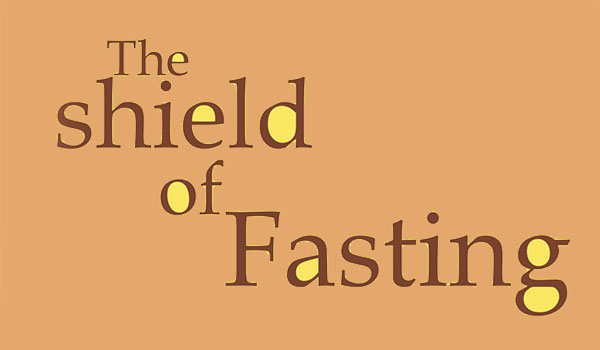
The shield of Fasting
The British neither had enough jails nor enough functionaries to keep the country operating. They were left with no volition but to free Gandhiji and other Congress leaders. Winston Churchill, a conservative member of the parliament announced that “Gandhi-ism and all that it stands for will have to be crushed.” But Gandhiji was almost God for the country and nobody would dare to crush him. After many discussions, Gandhiji cancelled the civil disobedience movement; British agreed on giving freedom on salt and freed the prisoners. With mutual understanding, a conference was arranged to sort out the issue of Indian Independence.
Gandhiji travelled across England calling for an honourable partnership between England and India. The conference in London could not bring out the solution; rather, all the representatives he met would only talk about preserving or extending their own rights and nothing seemed working in his favour. Gandhiji was a man of honour and he was never ashamed of the attire he wore. Even when he was invited for tea with the King and Queen he went wearing his loincloth and a shawl. When someone asked him if he had enough on, he replied, “The King had enough on for both of us.”
Gandhiji spent some time in England before returning to India. On his return, he found many civil liberties suspended and a number of Congress leaders behind the bars including Jawaharlal Nehru. Gandhiji tried to negotiate with the King of London but the cabinet had become harsher than ever before, leading to his arrest on 14th January, 1932. Twenty thousand people were again behind bars by February.
Meanwhile, the British started constructing a new constitution which stated that the Muslims would only vote for the Muslims, the Hindus would only vote for Hindus and the untouchables would only vote for the untouchables. Gandhiji knew this was going to create a rift between the untouchables and the Hindus, while he was striving hard to unite them. On September 13, Gandhiji announced that he would fast unto death if this rule was not abandoned. As always, the British feared his death, as nobody wanted to take the blame of his death on their shoulders as he was no less than God for the Indian masses. He started his fast on 20th September and within four days became extremely weak.The doctorsfeared,the fast if continued, would lead to his death. Many Indians, who followed him, fasted along with him and the country was lost in endless darkness.
At last a compromise was reached and Gandhiji broke his fast. There was no separation of voting between the Hindus and the untouchables and along with that the untouchables were given a particular number of reserved seats as well which would guarantee them representation. To Gandhiji’s delight,it was no less than a miracle. For the first time in three thousand years, the temples were opened for the untouchables and it was all due to this great man’s sufferings and influence.
In May 1933, Gandhiji fasted for twenty-one days for his personal reasons, but the British government petrified of him dying in their hands, released him from jail. After three days he was rearrested for a civil disobedience act and again freed; he was arrested once again for disobeying the court and was later released after he began fasting. ‘Bapu’ used the non- violent weapon of fasting several times in his life for various reasons. Although he was habituated to fast since childhood because of his angelic mother,still, fasting for such long periods was indeed a great deal which was not possible for an ordinary human being.
For the next six years, Gandhiji stayed out of jail and also out of politics but everything in the Congress party worked with his consent. The peasants would come and take his blessings and advice, while he would preach them the way of life.

Attaining ‘Swaraj’
England broke out the Second World War in September 1939 and included India without her consent. Offended,Gandhiji and Indians decided they would only help England in the war if they granted India its long awaited dream ‘Swaraj’. But Winston Churchill completely disagreed. Gandhiji along with Congress was firm on his decision of not supporting the Allies in the war without ‘Swaraj’.Again in 1940, Gandhiji proposed to support England and free India but Churchill disapproved once again. Finally, he, along with other Congress leaders decided to protest against their inclusion in the war.As usual,twenty-three thousand Indians were enforced behind the bars for this act of disobedience.
Japan had joined the Nazis against the British, and England without India’s help was in great turmoil. Keeping this in mind,the British freed many Indian leaders. America and China pressed Churchill to agree to the demands of Indian Independence. Though annoyed, helpless Churchill sent Sir Stafford Cripps to India with a series of proposals which offered a dominion status to India, but nothing seemed to be working in India’s favour.
Disappointed with Cripps, Gandhiji along with his leaders renewed civil disobedience and were arrested once again. The Indians filled with agitation, attacked the British with violence in response to the arrests. Gandhiji who always preached non-violence was disheartened with the outcome. The British accused him of being the sole reason for the violent scenario. Though he always fought for non-violence, he was the one who was blamed for it. Pained by such acquisitions, he decided to fast once again for 21 days. Old Gandhiji was now 72 years old and everyone expected him to die;even the British government freed him due to fear of his death, but he refused and fasted in jail. Unfortunately, not he, but his wife Kasturbai who accompanied him in jail died on his lap on 22nd February, 1944. The sixty year old marriage had come to an end. Filled with grief, Gandhiji said,“I feel the loss more than I thought I should.” Later,he was struck down by malaria and was freed from prison on 6th May, 1944.

“Don’t Cut India In Two”
After being released from the jail, the trauma for Gandhiji raised even more when Mohammad Ali Jinnah, the leader of the Muslim League demanded for a separate state cut out of India for Muslims. Gandhiji always wanted his countrymen to unite and stay under the same roof. For him, caste and creed was never a matter of consideration and he believed all human beings were equal. “All the religions of the world,” he once said, “while they may differ in other respects, untidily proclaim that nothing lives in this world but Truth.” For Gandhiji, his country was his family, division of which he could never ever stand.
Jinnah was a violent, crazy maniac who was one of the members of Congress before and he had now formed another political party ‘Muslim League’ which was anti-Congress. Where Gandhiji was a saint, Jinnah was a devil. He was ready to go to any extent for the sake of a separate state. Gandhiji once said, “You can cut me in two if you wish but don’t cut India in two.” Jinnah on the other hand, wouldn’t have minded doing both.
World War II ended in summer 1945 and Churchill was replaced by a new government. They made it clear they wanted an early realization of self-government in India. A British Commission was sent to India to work out the issue of independence and finally Nehru was told to form his government in August 1946. The British did not support partition of the country either. All this broke out into a ruthless riot and five thousand people were slaughtered in Calcutta.
77 year old Gandhi, trekked forty-nine villages barefoot over roads filled with filth or glass by his enemies and made each remote area calm during his pilgrimage in Bengal in the midst of riots. On February 1947, it was announced that England would leave India and Gandhiji’s dream of Swaraj was on its way, but Jinnah was still annoyed as the demand for a separate state was still not approved. He threatened Gandhiji of a civil war if his demands were not met. Hungry for Swaraj and to get rid of violence, the other Congress leaders agreed for a separate state but Gandhiji was adamant and did not want independence so much the way he wanted unity. Inspite of Gandhiji’s opposition, Jinnah’s demands were met. Jinnah died the following year dividing India.If independence would have waited a year and Gandhiji would have been heard, India would have been one even today.
The partition plan was announced on 3rd June and India attained freedom on 15th August,1947. But Gandhiji, disheartened with the division of his motherland,refused to participate in the celebration of freedom. Instead, he prayed in a Muslim household in Calcutta, where the slaughtering of humans was still taking place.
While he was trying to retain peace, Gandhiji was attacked by a mob in his bedroom. Saddened with the incident, he decided to fast until sanity returned to Calcutta. Within three days, everything fell in place and the leaders pledged it would never happen again. Peace and harmony returned in Calcutta,though the entire nation was burning with terror. Seven to eight million people were butchered in the riots during partition; the majority in both the states India and Pakistan kept slaughtering the minority. Around fifteen million people were displaced and the nation became crazy and rebellious. Disheartened,Gandhi moved on to Delhi, where the Hindus kept slaughtering the Muslims. Helpless and filled with sorrow, he used his weapon again and started to fast in Delhi on January 13, 1948 for peace. Old ‘Bapu’, who was now 78 years old, did not worry about himself but his heart pained for his countrymen.With the fear of losing the Mahatma, the Hindus stopped slaughtering the Muslims, and finally Gandhiji broke his fast.
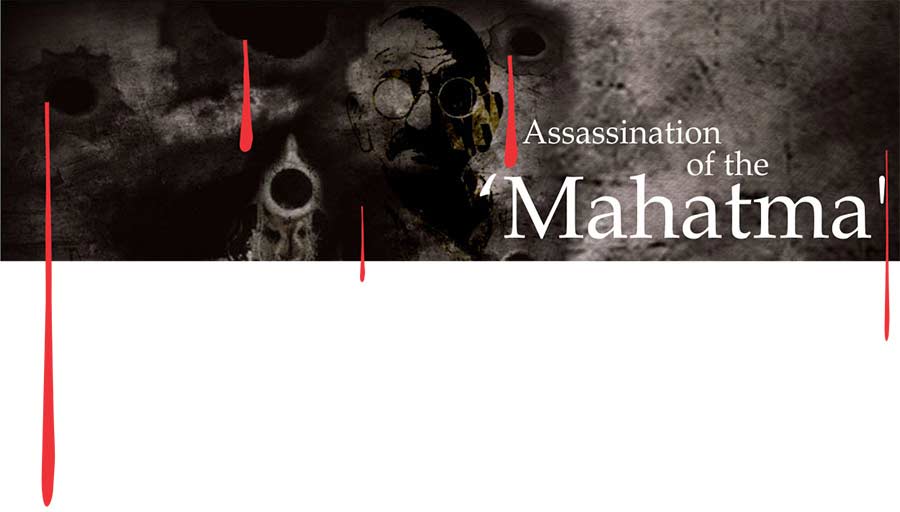
Assassination of the ‘Mahatma’
Gandhiji who was still striving with his health trying to recover from the fast,held a prayer meeting one evening.The holy prayer turned into an atrocious incident,when an explosion took place.To everyone’s surprise,the people behind the explosion were the demoniac fanatic Hindus who wanted to eradicate Gandhiji’s existence forever.They accused him of opposing them and supporting the Muslims and found him an obstacle in their way. Though Gandhiji was shielded in this incident;death awaited him on the next step.
On 30th January, 1948,Gandhiji held a prayer meeting outdoors according to his custom. A thirty-five year old newspaper editor, Nathuram Godse,who was a member of the fanatic group,sat in the front row of spectators. As Gandhiji walked through the crowd to sit on the platform, Godse removed his small pistol and shot him thrice at about 5:10 pm. The magnificent‘Mahatma’ crumbled and fell on the ground taking his last breath uttering the words, ‘Hey Ram’ (O God).
That night, a shaken and broken Nehru said, “The light has gone out of our lives and there is darkness everywhere…The light has gone out, I said, and yet I was wrong. For the light that shone in the country was no ordinary light. The light that has illuminated the country for these many years will illuminate this country for many more years, and a thousand years later that light will still be seen in this country, and the world will see it and it will give solace to innumerable hearts. For that light represented the living truth…”
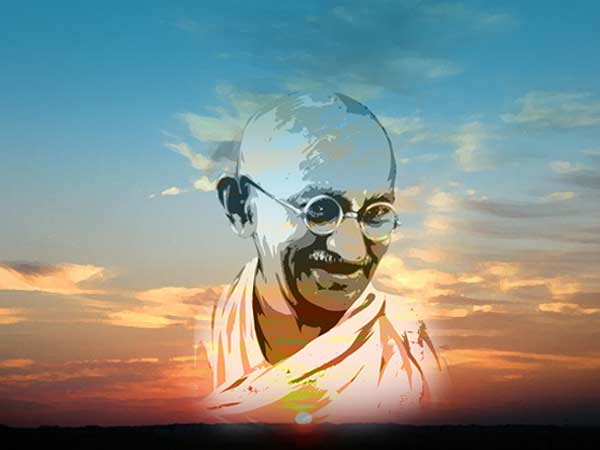
The After-Effects
“Generations to come will scarcely believe that such a one as this walked the earth in flesh and blood,” Albert Einstein once said after Gandhiji died. United Nations declared 15th June, 2007, as the international day of non-violence to honour him.His photograph was made a part of the Indian currency and also printed on the Indian postal stamps. He also became an inspiration for Martin Luther King who studied his philosophy of non-violence. To live a life of truth, kindness, humility, service and non-violence throughout a long difficult struggle against mighty adversaries was not a cup of tea, indeed he was a ‘Mahatma’. His spirit of truth is an example to many people even today.
Sir Ben Kingsley was an award winning actor who played the role of ‘Mahatma’ in the film ‘Gandhi’ which was based on his life..
“I know no other man of any time or indeed in recent history,” wrote Sir Stafford Cripps who so forcefully and convincingly demonstrated the power of spirit over material things. He invented a new possibility of human life which was not possible before him and not only worked for independence but paved a new way of human life. His life is an inspiration of what humans can become. His impact is immortal, impact which surpasses all boundaries of caste, of region and of time.
Biography of Mahatma Gandhi | 3 Comments >>
3 --Comments
These are actually wonderful ideas in about blogging. You have touched some nice factors here. Any way keep up wrinting.
It going to be ending of mine day, but before ending I am reading this impressive article to improve my knowledge.
Leave Comment.
Your email address will not be published. Required fields are marked.
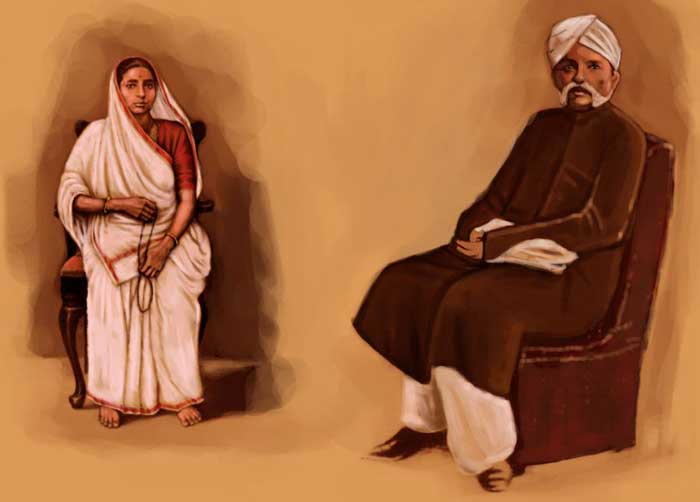
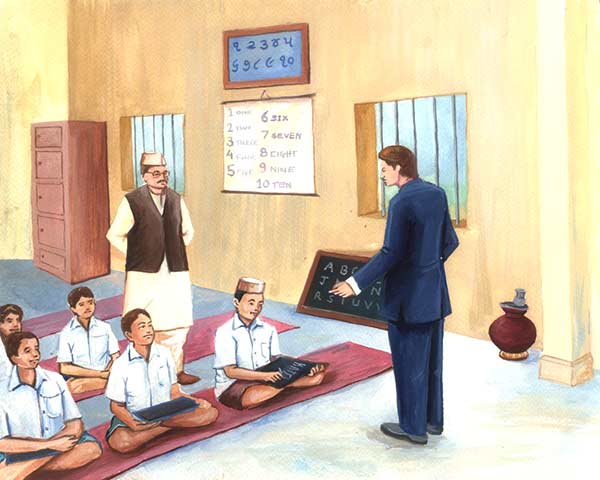
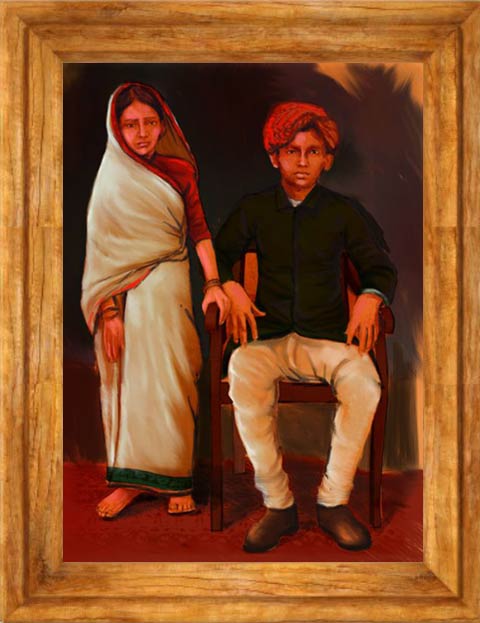
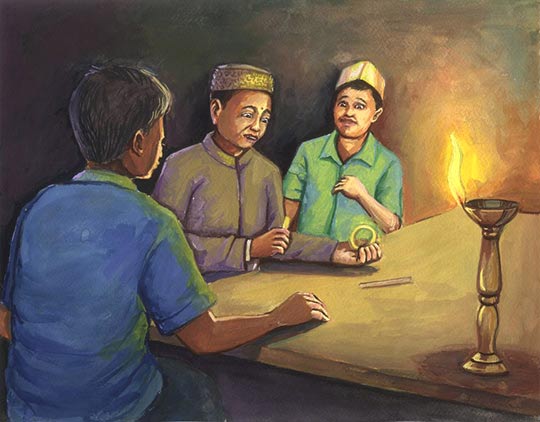
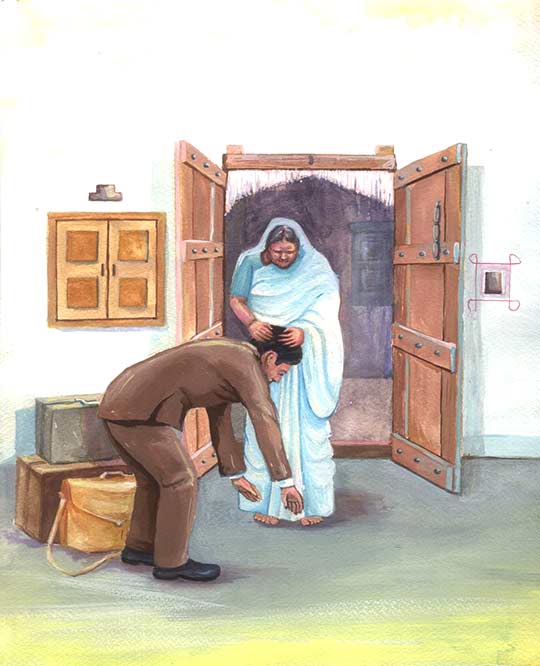

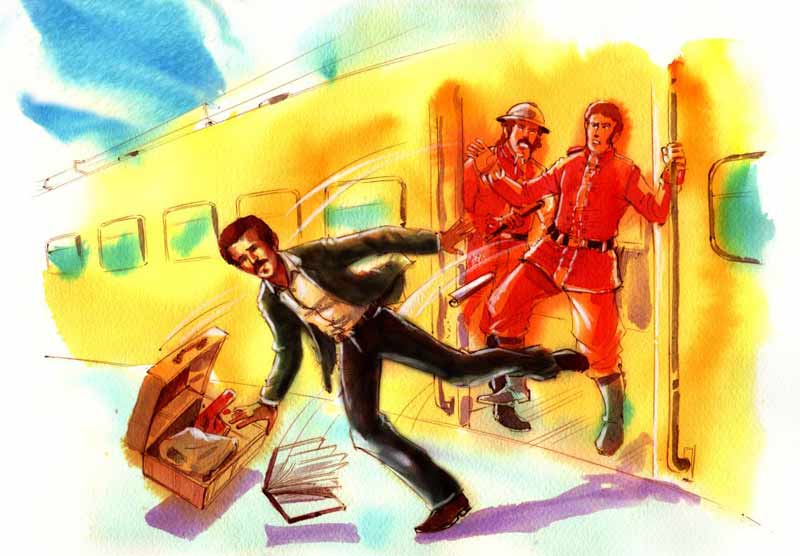
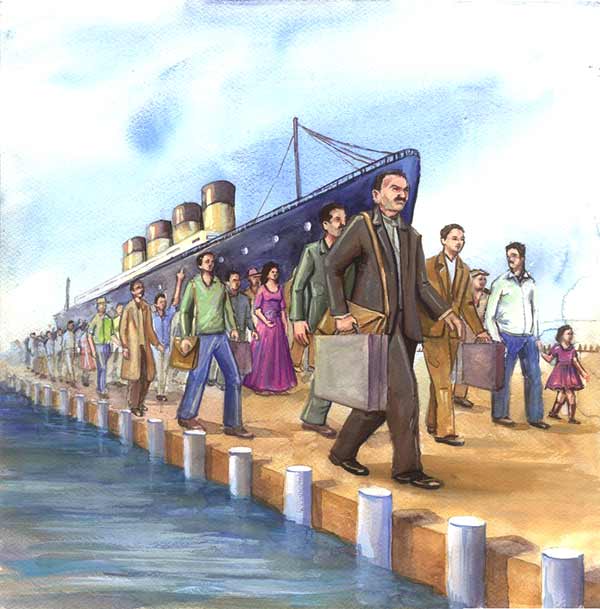
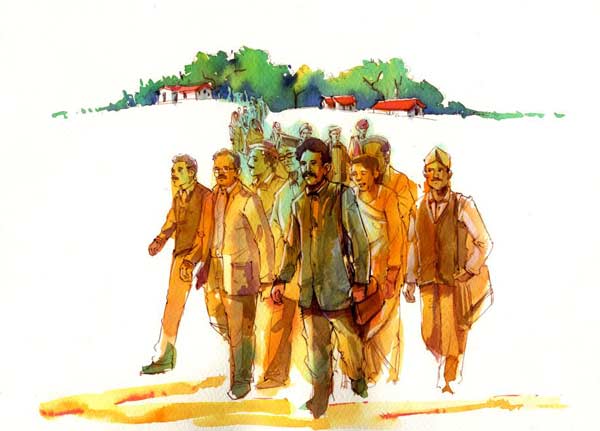
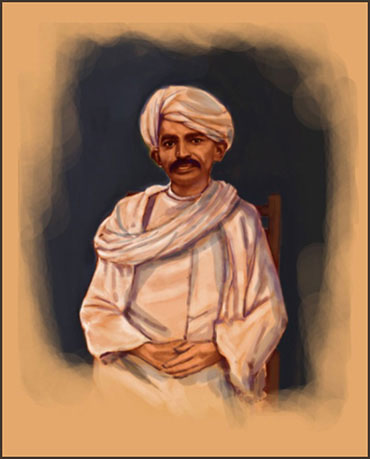
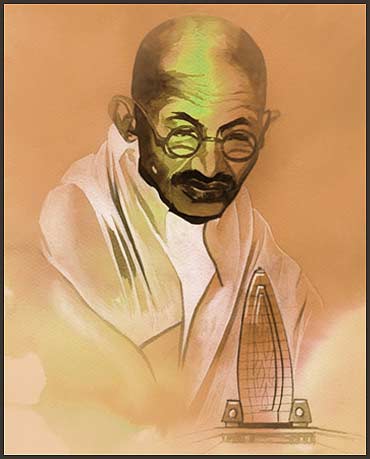
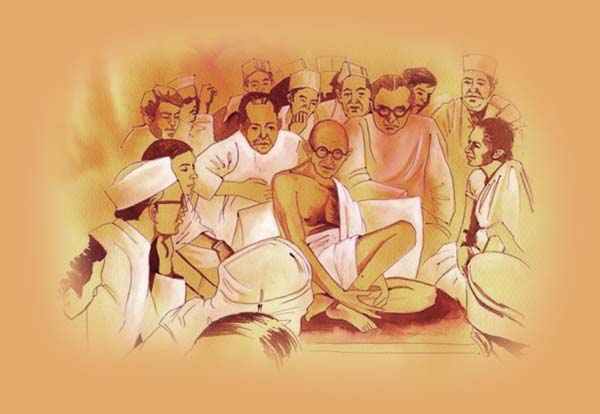
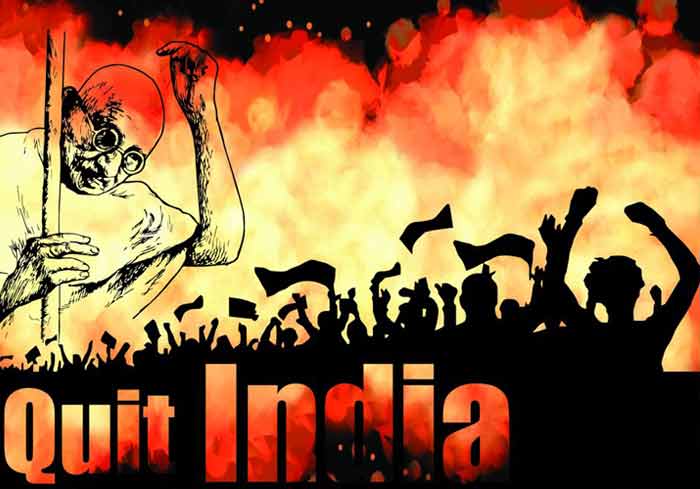
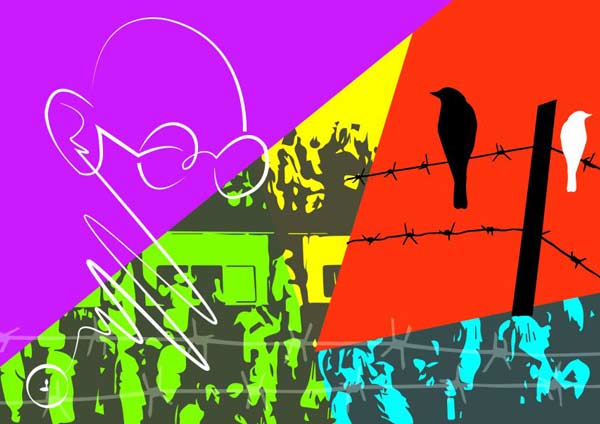
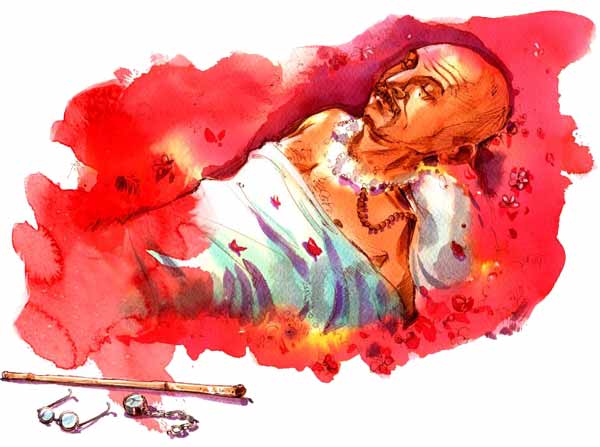


This is a topic that is near to my heart... Thank you!